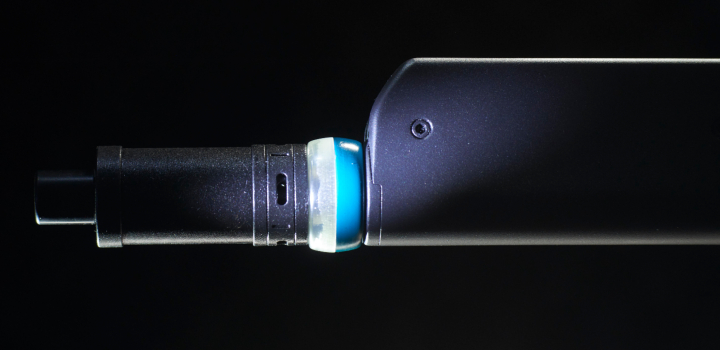How AI and ‘puff technology’ could help understanding of smoking behaviour
By: Communications

Researchers at the University of East Anglia are using new ‘puff technology’ to see how people who smoke and vape use e-cigarettes.
A new observational study launched today will see participants use a small monitoring device which screws onto tank-based e-cigarettes.
The device will measure the number and duration of puffs, time between puffs, and the power used per puff to build a personalised profile of the user’s vaping patterns.
It is the first time that the technology has been used in research and the results will be used to help develop AI (artificial intelligence) to help inform people about their vaping behaviour.
In the future, this information might be used to help smokers quit tobacco.
The team are looking for participants who smoke tobacco and who have recently also started using an e-cigarette (within the last three months).
Lead researcher Dr Emma Ward, from UEA's Norwich Medical School, said: “Dual using both e-cigarettes and tobacco is common and more than a third of UK e-cigarette users continue to smoke tobacco as well.
“But we know that smoking tobacco is much more harmful than vaping, and that people who switch from smoking cigarettes to vaping are more likely to remain smoke free. Vaping is a harm reduction approach to quitting smoking, allowing users to cope with nicotine withdrawal by using nicotine in a less harmful way.
“We want to find out more about how dual use varies over time, and what factors help or hinder smokers in switching away from smoking tobacco to using e-cigarettes.
“The new technology we’re using is more reliable and sophisticated than the puff counters which come integrated in many e-cigarettes and works by precision measurement of the voltage applied to the atomiser through the duration of the puff.
“It records the puff topography to build a personalised profile of the user's vaping patterns.”
The technology has been developed in partnership with VaipIO. And the monitoring system will be used to develop AI called ‘Level’ to help people stop smoking/vaping.
Level is an onboard computer for your e-cig. It learns how you vape and then uses that data to predict when you’ll crave a nicotine hit. Level is designed to help you understand your vaping behaviour by precisely monitoring use. This might be helpful for people wanting to control cravings to smoke, or wanting to reduce the amount of nicotine they are using in their e-cigarette.
It can also be used to maintain your current level of nicotine consumption and is very user-friendly, discreet and flexible, and aims to put you in control.
Dr Ward said: “This is the first time the technology has been used in research. It won’t fit all types of e-cigarettes however, and it is important to stress that participants do not have to use the monitoring device to take part in the study.”
The 90-day trial will see participants take part in a short daily online survey about smoking, vaping, mood, stress, alcohol consumption and social support. Participants do not need to try and change their dual smoking and vaping behaviour.
Dr Felix Naughton, from UEA’s School of Health Sciences and co-lead of the project, said: “We’re using a powerful scientific method to enable us to build a picture of each participant’s smoking and vaping behaviour. This gives us a rare view into how these behaviours fluctuate over time and what psychological, social and environmental factors influence this for each person.”
Dr Ward said: “Our findings will be important to help dual users reduce harm by stopping smoking and inform policy-decisions on how e-cigarettes can be promoted effectively to help people stop smoking and stay stopped.”
The TRAJECT study (Tracking via Repeated Assessment of Joint E-Cigarette and Tobacco use) is funded by Cancer Research UK, and is led by Prof Caitlin Notley, from UEA’s Norwich Medical School, and Dr Felix Naughton.
For more information or to take part, visit https://www.uea.ac.uk/groups-and-centres/addiction-research-group/traject.
Related Articles

Children who eat more fruit and veg have better mental health
Children who eat a better diet, packed with fruit and vegetables, have better mental wellbeing according to new research from the University of East Anglia Health and Social Care Partners.
Read more
UEA scientists to uncover infections that could cause aggressive prostate cancer
Researchers from the University of East Anglia are investigating whether certain infections could trigger the development of aggressive prostate cancer thanks to funding from leading mens health charity Prostate Cancer UK.
Read more
Thousands of men to trial prostate cancer home testing kit
Thousands of men worldwide are to receive a home test kit for prostate cancer thanks to pioneering research from the University of East Anglia and the Norfolk and Norwich University Hospital (NNUH).
Read more